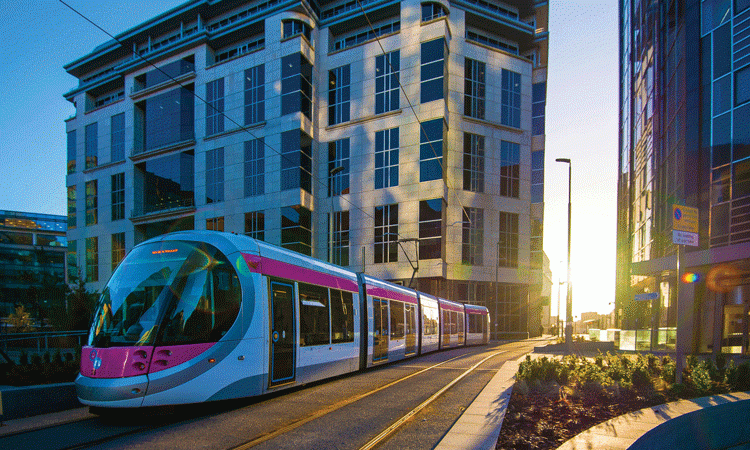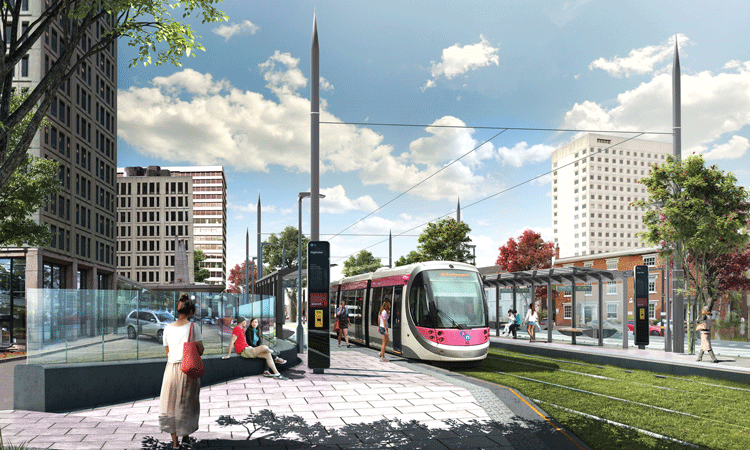Transforming the West Midlands by delivering the best integrated transport system for the future
- Like
- Digg
- Del
- Tumblr
- VKontakte
- Buffer
- Love This
- Odnoklassniki
- Meneame
- Blogger
- Amazon
- Yahoo Mail
- Gmail
- AOL
- Newsvine
- HackerNews
- Evernote
- MySpace
- Mail.ru
- Viadeo
- Line
- Comments
- Yummly
- SMS
- Viber
- Telegram
- Subscribe
- Skype
- Facebook Messenger
- Kakao
- LiveJournal
- Yammer
- Edgar
- Fintel
- Mix
- Instapaper
- Copy Link
Posted: 11 April 2017 | Alejandro Moreno (Midland Metro Alliance) | No comments yet
The Midland Metro Alliance is implementing a 10-year programme of tram extensions to deliver a legacy for the UK’s West Midlands that will help enable social and economic regeneration across the region. Alliance Director, Alejandro Moreno, provides more details.


Over the next 10 years, the Midland Metro Alliance, working on behalf of the West Midlands Combined Authority (WMCA), will expand the tram network by approximately 32km. The six projects that form the extension work of the Alliance are the Wolverhampton Interchange; Wednesbury to Brierley Hill; Birmingham Eastside; East Birmingham to Solihull; Birmingham to Centenary Square and Centenary Square to Edgbaston. These projects form a significant part of the ‘Movement for Growth’ strategy through which Transport for West Midlands (TfWM), the transport arm of the WMCA, will work to limit the effects of congestion by improving the availability of modes of transport other than the private car.
WMCA, the design consortium of Egis, Tony Gee and Pell Frischmann and contractor Colas Rail (supported by their sub-Alliance partners Colas Limited, Barhale, Bouygues UK and Auctus Management Group), came together to form the Midland Metro Alliance in July 2016.
The aim of the Alliance is to provide continuity, learn lessons and apply them to future schemes to help drive down costs, improve efficiency and reduce disruption during the construction phases. For example, the Alliance can develop a single trackform design which can be applied to the entire network, rather than this being done individually for each extension.
Each of the partner companies brings a complementary area of expertise to the Alliance, with many being international. The real focus, however, is on recruiting locally with the aim of leaving a legacy of skills and experience for the region, even after the extensions are complete.
Existing route
The Midland Metro tram operates between Wolverhampton and Birmingham via West Bromwich and Wednesbury. It is owned and promoted by TfWM and is currently operated by National Express Midland Metro, a subsidiary of National Express. It opened on 30 May 1999, mostly using the former Great Western Railway route between Birmingham Snow Hill and Wolverhampton.
The 1.2km-long Birmingham city centre extension which officially opened in 2016, expands the tram further into the city. Indeed, the extension, which goes through the heart of the city’s shopping district connecting Snow Hill station to the recently-redeveloped New Street station and its Grand Central retail complex, has proved highly successful with passenger numbers up by more than 30%.
Future routes
The next two planned extensions of the Midland Metro are due to open in 2019 for passenger service.
Within Birmingham, the line will continue from Grand Central past Birmingham’s Town Hall to Centenary Square. The area is currently seeing a lot of redevelopment, and the extensions to the metro are designed to tie-in with these developments. Enabling works are now underway, and the necessary agreements are being secured for this line to be extended to Edgbaston by 2021.
An exciting innovation related to the latest expansion plans is the use of batteries on the trams to enable catenary-free running. The technology has come a long way since its initial conception and catenary-free running is now a viable solution to greatly improve the aesthetics in urban spaces.
Catenary-free operation will not be limited to the Centenary Square route either – it will also be deployed on other proposed extensions because, as well as the aesthetic benefits, it also removes stray current risks and reduces clearance requirements underneath structures.


An artist’s impression of the Edgbaston terminus due for completion in 2021
Continued development
In Wolverhampton, a 700m-long extension will split from the existing route just before the current terminus at St George’s. It will run along and stop at the city’s bus station before continuing to the railway station.
The extension forms part of the Wolverhampton Interchange Project which is a major regeneration project to renew Wolverhampton city centre by radically improving the transport gateways and connections. Alongside a major commercial and leisure development, the project will deliver over 1,500 jobs and improve transport for the people of Wolverhampton and the Black Country as a whole.
After the opening of the Wolverhampton extension, two branches for the Metro terminus will exist in the city, which will be useful as the network continues to grow.
In October 2016, a Transport and Works Act Order application was submitted to take Midland Metro to Digbeth and serve the planned High Speed Two (HS2) station at Curzon Street. This route would separate from the current one near Bull Street making the tram stop an important interchange for accessing services to Digbeth, Edgbaston and Wolverhampton. A decision on the application is expected in 2018, with the aim that passenger services start in 2023, ahead of the opening of HS2 in 2026.
The final two schemes are much longer in scale. One is an extension of approximately 11km from Wednesbury running via Dudley to Brierley Hill, with approximately 7km of this route using an abandoned railway corridor.
An important driver for this route is the creation of a link from this part of the Black Country to HS2 and everywhere in-between. Vegetation clearance works have recently been completed for this route, with the line planned to be open for passenger services in 2023.
The final extension planned will see the route to Digbeth extended further eastwards to serve Solihull and terminate at the HS2 Interchange station, allowing passengers access by tram to the airport and National Exhibition Centre. It is hoped to be open for passenger use in 2026.
Midland Metro Alliance is aiming not only to construct a state-of-the-art Metro system, but to also leave a lasting legacy that the region can be proud of. An integrated system that massively improves access for residents, businesses and visitors alike is essential to aid regeneration of the region and we look forward to contributing to this goal.


Related topics
Fleet Management & Maintenance, Infrastructure & Urban Planning, Passenger Experience, Public Transport
Issue
Issue 2 2017
Related modes
Light Rail
Related cities
Europe
Related organisations
Midland Metro, Midland Metro Alliance







